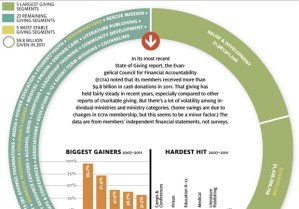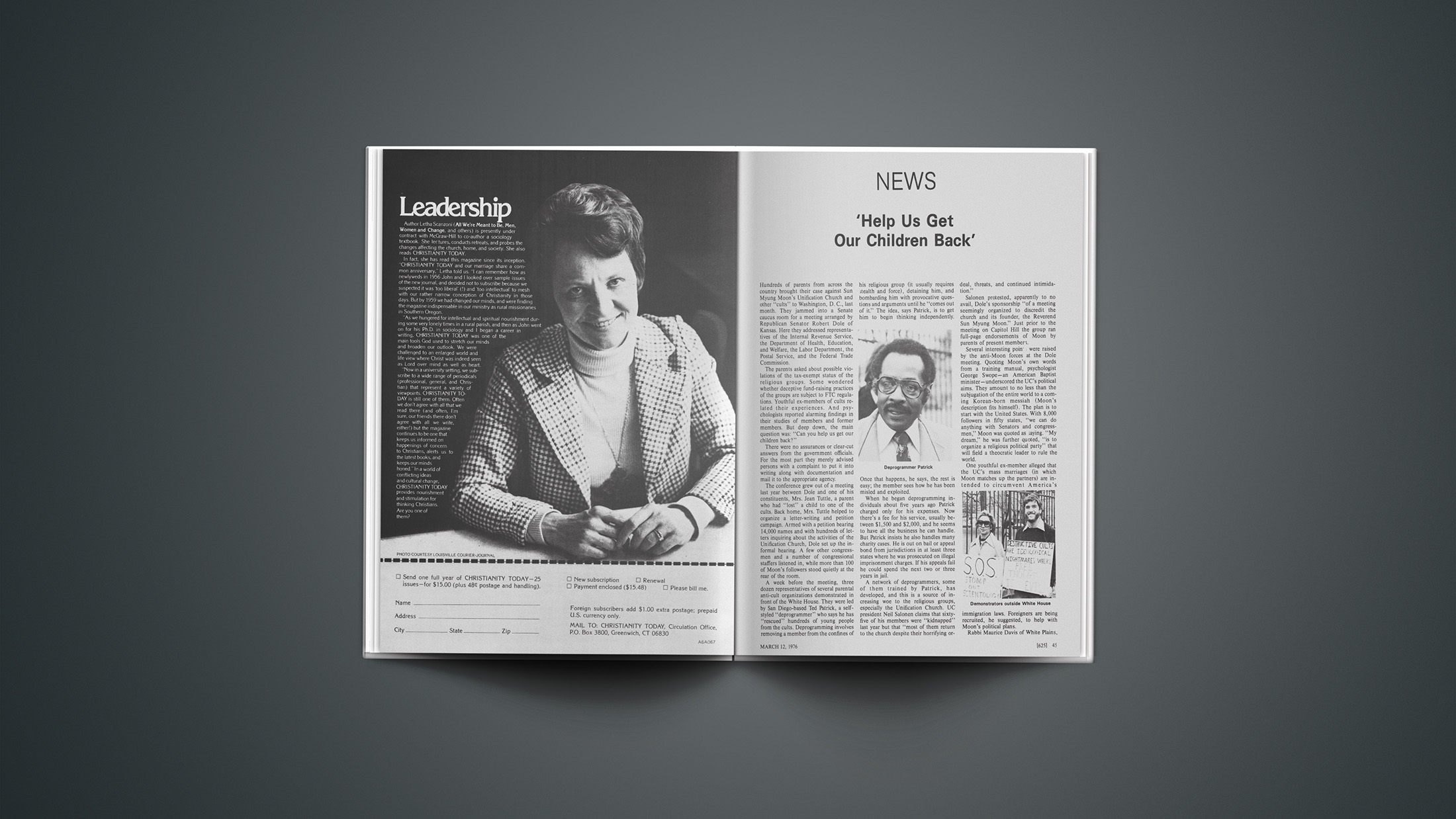In this series

A tip for Christian ministries: Millennials will give you more money if you encourage them to make a “meaningful” gift rather than a “generous” one.
The Evangelical Council for Financial Accountability (ECFA) surveyed more than 16,500 people who had recently donated to 17 of its member ministries. Researchers studied both millennial givers and those over the age of 35, comparing the differences in order to draw a profile of the millennial Christian giver.
Almost all millennials surveyed by the gave to their church in the past few years (92%). About a third gave to denominational ministries (35%); slightly more gave to secular charities (39%).
“Understanding the next generation is crucial for nonprofit organizations, and ECFA is pleased to offer insight into this important segment of givers,” ECFA president and CEO Dan Busby stated. “Millennials see the world in a whole new way, and gaining access to this lens is the only way organizations will stay relevant. Donors under the age of 35 are passionate about life and connected deeply to causes they care about—an encouraging sign for nonprofit organizations endeavoring to do good work in the world today.”
They’re definitely passionate. When millennials give to a ministry for the first time, they’re more likely than those over 35 to feel hopeful (69% vs. 60%), generous (45% vs. 25%), and spontaneous (18% vs. 11%). In fact, they’re more likely to feel every emotion ECFA asked about.
“Millennials show a broader and richer range of emotions than any previous generation,” stated the ECFA report, suggesting that it’s “perhaps because of their limited experience.”
Perhaps also a result of their youth, millennials are less likely than older generations to worry about ministries keeping administrative costs low; assuming that a one-time gift is a promise of future giving; or contacting a donor for more money. They’re also slightly less concerned about ministries using a gift only for what they say they will; not increasing the frequency of donation requests; avoiding political causes; or saying thank you.
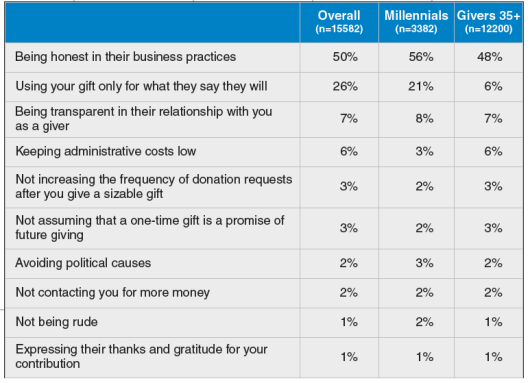
When asked about the most important quality of a ministry, more than half of millennials (56%) and nearly half of older givers (48%) named honesty, followed by another form of honesty: using a gift only as specified (21% of millennials vs. 26% of older givers).
All givers felt that charities should uphold specific financial standards, but millennials were less likely (85% vs. 93%) to list it as “extremely important.”
Younger givers choose Christian organizations because they share Christ and spread the gospel (37% vs. 32% of older givers) and because they serve spiritual and physical needs (21% vs. 13%).
Meanwhile, older givers are choosing Christian charities because they believe they have more integrity and accountability than secular organizations (26% vs. 19% of millennials).

While older givers are more likely to trust Christian organizations, millennials are significantly more likely to say that someone might give to a secular organization because it’s more effective and efficient (22% vs. 12%). They’re also slightly more likely to see giving to a secular organization out of a mistrust of Christian agencies (11% vs. 8%).
Younger givers are also more likely to suggest that donors might give to a secular charity because they are unaware of Christian options (13% vs. 6%), which may suggest “they themselves feel less informed,” stated ECFA.
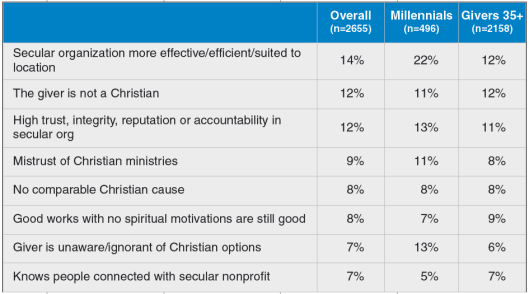
Most givers say they give because they’ve been blessed. Younger donors are slightly less likely to say they give because their gift makes a difference (20% vs. 23%), and slightly more likely to give to a charity that employs someone they know (11% vs. 8%). A similar percent of millennials said they’re more likely to give because of the person asking (12% vs. 7%).
Younger givers were also more interested in hearing from charities than older givers were. More said they’d prefer communication every two to three weeks (9% vs. 4%) or every month (35% vs. 29%), while fewer said they’d only like a message every six months (12% vs. 17%) or a year (11% vs. 19%).
Their actions bear this out. Millennials pay closer attention to every form of communication—except postal mail—that they receive from charities.
 An Interview With Charles ColsonCharles Colson was one of the principal White House aides to former President Nixon. His reputation is probably best represented by the statement attributed to him that he would be willing to walk over his grandmother (as depicted on our cover) to ensure Nixon’s election. Although, as is often the case with famous quotes, he really didn’t say it, he admits that his attitude was such that he could have—speaking figuratively. In his new book, Born Again (distributed by Revell), Colson recounts the story of his conversion to Christ, and the events in his life in earlier and later years that prepared for it. He also tells of his subsequent prison experiences. Christianity Today’seditors interviewed Colson recently and here is the edited distillation.Question. You are traveling around quite a bit now, and with the publication of your book you will probably keep doing so. How do you sense the mood of the country?Answer. My basic concern is that you have in this country today a widespread apathy and disenchantment. A feeling on the part of the people that as individuals they can’t do anything. What we are living with is the result of a decade of frustration over war, Watergate, riots, domestic dissent, turmoil, and a period of about twenty-five years or more in this country in which people have had steadily inflated expectations of what government can do for them. Each time around they are disappointed. As long as people are looking to a man or a group of men to provide the leadership, they are going to be disappointed. There are Christians who seem to say, “If only we had a Christian in the White House we would solve all our problems.” Well, I think that is nonsense. It is false to think that the one man who is head of the government has a particular, divine influence and has the only pipeline to God so that the rest of us can just rely on that.Q. We shouldn’t expect too much then even from the Christian who is in politics?A. The real answer is in the heart of each one of us as believers, and each one of us as citizens of a free country. The parallels in this country right now with the conditions in the Weimar republic in pre-Hitler days are terrifyingly vivid, in my mind. It would be the easiest thing in the world for a demigogue of the left or the right to come in and sweep the country if he had a charismatic personality, if he could promise people that he was going to solve all the ills of our society and gave them hope. If a country is desperate enough, it will rally behind a strong leader.Q. Then you think we could avoid a retreat by Christians by urging them to be more active in local politics and paying more attention to what goes on in the county courthouse?A. Yes, that’s part of it. To get Christians to take on more civic responsibility and more involvement in their community. Government is a big part of the problem, but the other part of the problem, it seems to me, which is even more fundamental, is that every believer in this country should once a day at least be looking inside of himself, realizing that it begins with him. He needs to decide whether he has his own priorities in order, and is trying to live his own life according to what Christ teaches us. And then he needs to reach out and touch one other person with Christ’s love. I think if you had a spiritual awakening in this country, it would be a lot less important whom we elect to office because the politicians still mirror the mood and the attitudes of the American people.Q. To be elected to high office—local, state or national-does one need the help of people of the sort you say you were before your conversion? If that is so, how can a Christian be in politics and remain consistent as a Christian?A. If you want to get elected to public office by the conventional standards, you need guys who know how to mix it up in the give-and-take battles of American politics. But I don’t believe that is the only way to get elected. Today, there are a number of men in this government who are committed to Jesus Christ first, and I believe several would step down from public office before they would compromise their commitment to Christ. One Senator I know well has his office staffed with brothers who know the Lord, he has all the protection built right into his own offices, and he has a prayer group that meets with him regularly, if they saw him doing something they thought was contrary to his commitment, they would be the first to tell him.Q. You refer in your book to “the enemies” as “those who opposed the noble goals we set up … for peace in the world.” Of all the political opponents of President Nixon, which ones did you think really wanted, instead of peace and stability, war and instability?A. If you believe that your policies were going to lead to a stable peace in Southeast Asia, and you were being opposed by people who had equally patriotic motives and believed that their opposition to the war would lead to a more stable peace, then you looked upon them as opposing your goals.Q. Your goals or your methods?A. Your goals. I happen to believe that going into Viet Nam was a serious mistake and I believed that in 1964. I thought the Gulf of Tonkin incident was phony. I also believe going out the way we did—hundreds of thousands of people were depending on us, staking their lives on us, and then we walk away from them and you now have heard about the blood baths in Cambodia—that is just as immoral as whatever questionable judgments led us into the war, if not more so.Q. Weren’t there some things Christians ought to have done during Watergate to keep it all from happening?A. No, Watergate or something like it was inevitable. If Watergate marks the point at which we begin to reassess our whole national value structure of individual and government, what government can do, what the individual’s responsibility is, and the limitations on government, then it could be a very healthy, cleansing process. The nation needed some kind of cleansing process, because there was the growth of what is called the imperial presidency. If there had not been a Watergate, there would have been something like a Watergate. If Watergate could mark the beginning of a re-evaluation of people’s goals and dreams, their ideals and dreams about themselves and their government, then it would be a healthy country. I don’t think the Christian community in the United States could have done anything to prevent Watergate.Q. Would you comment on the frequent observation that it is not good that new Christians be widely publicized soon after their conversion?A. I never would have sought publicity about my conversion. I was really very genuinely upset when the first inquiry came. But then I had to figure that God had put me in that position for some reason, and I knew I would get a lot of ridicule, and I did, and still do. But I did not feel under all the circumstances I had any choice. If I had not spoken exactly the way I believed at that time, then I think I would have been, in effect, renouncing my beliefs. On the other hand, I never would have made it without a small group of men around me who sustained me all the time. I would never be making it today without brothers in Christ. I have a great deal of difficulty going somewhere and speaking unless they meet with me and we pray hard ahead of time. A couple of times last fall I was ready to abandon speaking. I hope I am not on an ego trip, but that is something you worry about constantly and your brothers will protect you against. The best advice I could give a young Christian, a new believer, which I still consider myself to be, is to go very slow, to surround himself with people who care about him, who will help him, who will encourage him when he needs encouragement, and knock him down when he needs knocking down. He should not allow himself to be used to the point where he is milked for a good story but isn’t himself growing spiritually.Q. In your travels now, is there anything that you sense that may make you think we could be on the verge of a great spiritual awakening?A. Very spotty. You don’t get the same feeling everywhere in the country. Some places I can feel the power of God and the Holy Spirit just sweeping and people really hungering and wanting and feeling. In other places that isn’t happening.Q. Do you find any pockets of spiritual strength and interest and impact near Washington?A. Yes. I think one of the places where, in talking with large groups and small, I feel a tremendous spiritual power and a spiritual force at work is right here in the city. I really believe that God is working in a very powerful way in this city.Q. Do you feel that with the coming of a spiritual awakening there would be a greater neglect of government institutions?A. Oh, no. If the heart of the country really is turned to God, the pagans would have a very difficult time running the country. Or they would certainly at least have to run it in accord with what the heart of the nation wanted. You know, we do still have a very responsive system of government. I sat there for four years figuring out a way to respond to the will of the people. Politicians are going to be very, very sensitive to the pulse beat of the country.Q. Do you think such an awakening would make any difference in the racial tensions that are still very present in our country?A. Well, I don’t suppose changes like these automatically follow; it takes leadership. But if a person is really in Christ, if he is really walking with Christ, he could not possibly discriminate against anyone. Christians live in two worlds, and we get torn by the social mores of the areas in which we live. I really believe a Christ-centered revival would be a tremendous reconciling force in the country at a time when we need reconciliation.Q. Has your conversion made any significant differences in your political opinions?A. Oh, I think it has made some difference. It has brought me back to some fundamentals that I had gotten away from. You know, I regarded myself as a kind of Jeffersonian liberal. But when a man gets in the government, then he becomes a sort of statist, which is neither Jeffersonian liberalism nor modern-day conservatism. On fundamental issues about the relationship of men and government, and the role of government in society I do not believe my conversion has changed my political views; it has probably reinforced them.Q. You weren’t being consistent with your underlying political views then when you were serving President Nixon.A. No, I realize that I was not.Q. What counsel would you give to churches about how they can get their members to witness better?A. The last thing that I would do as a layman who has known Christ for less than three years is to tell any church how to do a better job of witnessing. However, one of the things I believe very strongly in is that a Christian, no matter how fervent his belief, is really unable to make it if he is walking alone. The only way you can have spiritual power is by having a fellowship of men and women around you who will really help you and guide you and be as one with you. You need the spiritual power that comes from the unity of men and women bonded together in Christ.Q. If you had been a Christian when you were in the White House, would you still have been able to work with the President and give him the kind of political help he needed?A. Yes, I honestly believe I could have done that. I think if I believed the way I do today and had the support of a group of brothers, then I could have helped Nixon in some very, very fundamental ways in which I did not help him.Q. How long could you have stayed there under those circumstances?A. Maybe not very long. But long enough to have made a dent in a few areas. I used to argue with Nixon. I used to take him on. Some of the tapes that have never been published show me really telling him off about Watergate. “Tell the truth. Get rid of it.” And he didn’t like it. He got angry at me. But very few people did that, and I only did it near the end, when I knew I was leaving anyway. If you really believed that Christ is the center of your life and that’s all that matters, then you wouldn’t care if you get thrown out by telling the President exactly what he should hear.Q. What are you doing now to occupy your time?A. I’m finding it really thrilling and exciting to work with men in the prisons, to try to change the terribly oppressive way of life that is so contrary to building the kind of character in men that will enable them to come back into society. The prison system is so self defeating, and there is so much that needs to be done. Frankly, I’m speaking more than I enjoy, but when I realize I do have a platform and an opportunity to confront people with the reality of Christ, it’s hard to say no. I have no idea where the Lord is leading me to, all I know is I’ve turned down three or four very attractive propositions in private industry because I’d rather be doing what I am doing.Q. You said that a large part of our prison system is counter productive, and self defeating.A. Yes, it’s very self defeating. The basic problem is that the culture and entire way of life inside prison is 180 degrees opposite to the way of life that you’re trying to inculcate in a criminal offender who is going to be put back into the street. If you want a man not to be a criminal you must teach him to have self-respect, respect for the law, belief in family, in community, and in himself, ability to work, dignity. As a deterrent to crime punishment is important, but punishment and prison we too often think of as synonymous. You can punish a man without putting him in that kind of debilitating, demoralizing, depressing, oppressive environment.Q. How?A. By fines, loss of professional status, alternate public service, counseling if the offender is a drunk. Many Americans are in prison because they are alcoholics who were drunk or had black-outs when they broke a law.Q. How can Christians be involved effectively in a prison ministry? It now mostly consists of a Sunday afternoon jail service; that’s it.A. That’s the worst thing Christians can do: going into a prison and promising things they can’t deliver. The history of a typical prisoner’s life is one of rejection, and this goes way back in his life. Then people go into a prison and say, “I want to help you;” they give the inmates a nice talk, and then walk out and don’t come back. The typical convict’s reaction is, “Oh, another con job, more of those who say they want to do something, and then we never see them again.” If enough people went into the prisons with the idea of taking a personal interest in one man or one woman you would quickly, quickly begin to reduce the prison population and the crime rate in the United States. When the prisoner is released, such a friend takes that ex-convict and tries to help him or her find a job and a place to live. The biggest single deterrent for that person to go back to prison is that he is not going to let his friend down. Sometimes for the first time in his life, someone is taking a real interest in him and cares for him, and he isn’t going to mess it up, he isn’t going to betray that friendship.Q. Could you comment on this whole philosophy of person-to-person contact with respect to the kinds of prisons without bars, for example, the ghettos, hunger, being on welfare with no opportunity to work.A. Alcohol is a prison, the country club is a prison, the executive suite is a prison, society is full of prisons. I believe God put me in a prison with bars for a purpose and that is where I put my primary effort. You are absolutely right; there are many, many prisons in our society, and I would hope that believers who feel that they are being led by the Lord would be dealing with those areas. My brother Harold Hughes deals with alcoholics. Another brother works with the inner-city problems. But no one of us is going to be able to turn the world upside down overnight. We just keep doing our work each day and hope it will spread out from there.
An Interview With Charles ColsonCharles Colson was one of the principal White House aides to former President Nixon. His reputation is probably best represented by the statement attributed to him that he would be willing to walk over his grandmother (as depicted on our cover) to ensure Nixon’s election. Although, as is often the case with famous quotes, he really didn’t say it, he admits that his attitude was such that he could have—speaking figuratively. In his new book, Born Again (distributed by Revell), Colson recounts the story of his conversion to Christ, and the events in his life in earlier and later years that prepared for it. He also tells of his subsequent prison experiences. Christianity Today’seditors interviewed Colson recently and here is the edited distillation.Question. You are traveling around quite a bit now, and with the publication of your book you will probably keep doing so. How do you sense the mood of the country?Answer. My basic concern is that you have in this country today a widespread apathy and disenchantment. A feeling on the part of the people that as individuals they can’t do anything. What we are living with is the result of a decade of frustration over war, Watergate, riots, domestic dissent, turmoil, and a period of about twenty-five years or more in this country in which people have had steadily inflated expectations of what government can do for them. Each time around they are disappointed. As long as people are looking to a man or a group of men to provide the leadership, they are going to be disappointed. There are Christians who seem to say, “If only we had a Christian in the White House we would solve all our problems.” Well, I think that is nonsense. It is false to think that the one man who is head of the government has a particular, divine influence and has the only pipeline to God so that the rest of us can just rely on that.Q. We shouldn’t expect too much then even from the Christian who is in politics?A. The real answer is in the heart of each one of us as believers, and each one of us as citizens of a free country. The parallels in this country right now with the conditions in the Weimar republic in pre-Hitler days are terrifyingly vivid, in my mind. It would be the easiest thing in the world for a demigogue of the left or the right to come in and sweep the country if he had a charismatic personality, if he could promise people that he was going to solve all the ills of our society and gave them hope. If a country is desperate enough, it will rally behind a strong leader.Q. Then you think we could avoid a retreat by Christians by urging them to be more active in local politics and paying more attention to what goes on in the county courthouse?A. Yes, that’s part of it. To get Christians to take on more civic responsibility and more involvement in their community. Government is a big part of the problem, but the other part of the problem, it seems to me, which is even more fundamental, is that every believer in this country should once a day at least be looking inside of himself, realizing that it begins with him. He needs to decide whether he has his own priorities in order, and is trying to live his own life according to what Christ teaches us. And then he needs to reach out and touch one other person with Christ’s love. I think if you had a spiritual awakening in this country, it would be a lot less important whom we elect to office because the politicians still mirror the mood and the attitudes of the American people.Q. To be elected to high office—local, state or national-does one need the help of people of the sort you say you were before your conversion? If that is so, how can a Christian be in politics and remain consistent as a Christian?A. If you want to get elected to public office by the conventional standards, you need guys who know how to mix it up in the give-and-take battles of American politics. But I don’t believe that is the only way to get elected. Today, there are a number of men in this government who are committed to Jesus Christ first, and I believe several would step down from public office before they would compromise their commitment to Christ. One Senator I know well has his office staffed with brothers who know the Lord, he has all the protection built right into his own offices, and he has a prayer group that meets with him regularly, if they saw him doing something they thought was contrary to his commitment, they would be the first to tell him.Q. You refer in your book to “the enemies” as “those who opposed the noble goals we set up … for peace in the world.” Of all the political opponents of President Nixon, which ones did you think really wanted, instead of peace and stability, war and instability?A. If you believe that your policies were going to lead to a stable peace in Southeast Asia, and you were being opposed by people who had equally patriotic motives and believed that their opposition to the war would lead to a more stable peace, then you looked upon them as opposing your goals.Q. Your goals or your methods?A. Your goals. I happen to believe that going into Viet Nam was a serious mistake and I believed that in 1964. I thought the Gulf of Tonkin incident was phony. I also believe going out the way we did—hundreds of thousands of people were depending on us, staking their lives on us, and then we walk away from them and you now have heard about the blood baths in Cambodia—that is just as immoral as whatever questionable judgments led us into the war, if not more so.Q. Weren’t there some things Christians ought to have done during Watergate to keep it all from happening?A. No, Watergate or something like it was inevitable. If Watergate marks the point at which we begin to reassess our whole national value structure of individual and government, what government can do, what the individual’s responsibility is, and the limitations on government, then it could be a very healthy, cleansing process. The nation needed some kind of cleansing process, because there was the growth of what is called the imperial presidency. If there had not been a Watergate, there would have been something like a Watergate. If Watergate could mark the beginning of a re-evaluation of people’s goals and dreams, their ideals and dreams about themselves and their government, then it would be a healthy country. I don’t think the Christian community in the United States could have done anything to prevent Watergate.Q. Would you comment on the frequent observation that it is not good that new Christians be widely publicized soon after their conversion?A. I never would have sought publicity about my conversion. I was really very genuinely upset when the first inquiry came. But then I had to figure that God had put me in that position for some reason, and I knew I would get a lot of ridicule, and I did, and still do. But I did not feel under all the circumstances I had any choice. If I had not spoken exactly the way I believed at that time, then I think I would have been, in effect, renouncing my beliefs. On the other hand, I never would have made it without a small group of men around me who sustained me all the time. I would never be making it today without brothers in Christ. I have a great deal of difficulty going somewhere and speaking unless they meet with me and we pray hard ahead of time. A couple of times last fall I was ready to abandon speaking. I hope I am not on an ego trip, but that is something you worry about constantly and your brothers will protect you against. The best advice I could give a young Christian, a new believer, which I still consider myself to be, is to go very slow, to surround himself with people who care about him, who will help him, who will encourage him when he needs encouragement, and knock him down when he needs knocking down. He should not allow himself to be used to the point where he is milked for a good story but isn’t himself growing spiritually.Q. In your travels now, is there anything that you sense that may make you think we could be on the verge of a great spiritual awakening?A. Very spotty. You don’t get the same feeling everywhere in the country. Some places I can feel the power of God and the Holy Spirit just sweeping and people really hungering and wanting and feeling. In other places that isn’t happening.Q. Do you find any pockets of spiritual strength and interest and impact near Washington?A. Yes. I think one of the places where, in talking with large groups and small, I feel a tremendous spiritual power and a spiritual force at work is right here in the city. I really believe that God is working in a very powerful way in this city.Q. Do you feel that with the coming of a spiritual awakening there would be a greater neglect of government institutions?A. Oh, no. If the heart of the country really is turned to God, the pagans would have a very difficult time running the country. Or they would certainly at least have to run it in accord with what the heart of the nation wanted. You know, we do still have a very responsive system of government. I sat there for four years figuring out a way to respond to the will of the people. Politicians are going to be very, very sensitive to the pulse beat of the country.Q. Do you think such an awakening would make any difference in the racial tensions that are still very present in our country?A. Well, I don’t suppose changes like these automatically follow; it takes leadership. But if a person is really in Christ, if he is really walking with Christ, he could not possibly discriminate against anyone. Christians live in two worlds, and we get torn by the social mores of the areas in which we live. I really believe a Christ-centered revival would be a tremendous reconciling force in the country at a time when we need reconciliation.Q. Has your conversion made any significant differences in your political opinions?A. Oh, I think it has made some difference. It has brought me back to some fundamentals that I had gotten away from. You know, I regarded myself as a kind of Jeffersonian liberal. But when a man gets in the government, then he becomes a sort of statist, which is neither Jeffersonian liberalism nor modern-day conservatism. On fundamental issues about the relationship of men and government, and the role of government in society I do not believe my conversion has changed my political views; it has probably reinforced them.Q. You weren’t being consistent with your underlying political views then when you were serving President Nixon.A. No, I realize that I was not.Q. What counsel would you give to churches about how they can get their members to witness better?A. The last thing that I would do as a layman who has known Christ for less than three years is to tell any church how to do a better job of witnessing. However, one of the things I believe very strongly in is that a Christian, no matter how fervent his belief, is really unable to make it if he is walking alone. The only way you can have spiritual power is by having a fellowship of men and women around you who will really help you and guide you and be as one with you. You need the spiritual power that comes from the unity of men and women bonded together in Christ.Q. If you had been a Christian when you were in the White House, would you still have been able to work with the President and give him the kind of political help he needed?A. Yes, I honestly believe I could have done that. I think if I believed the way I do today and had the support of a group of brothers, then I could have helped Nixon in some very, very fundamental ways in which I did not help him.Q. How long could you have stayed there under those circumstances?A. Maybe not very long. But long enough to have made a dent in a few areas. I used to argue with Nixon. I used to take him on. Some of the tapes that have never been published show me really telling him off about Watergate. “Tell the truth. Get rid of it.” And he didn’t like it. He got angry at me. But very few people did that, and I only did it near the end, when I knew I was leaving anyway. If you really believed that Christ is the center of your life and that’s all that matters, then you wouldn’t care if you get thrown out by telling the President exactly what he should hear.Q. What are you doing now to occupy your time?A. I’m finding it really thrilling and exciting to work with men in the prisons, to try to change the terribly oppressive way of life that is so contrary to building the kind of character in men that will enable them to come back into society. The prison system is so self defeating, and there is so much that needs to be done. Frankly, I’m speaking more than I enjoy, but when I realize I do have a platform and an opportunity to confront people with the reality of Christ, it’s hard to say no. I have no idea where the Lord is leading me to, all I know is I’ve turned down three or four very attractive propositions in private industry because I’d rather be doing what I am doing.Q. You said that a large part of our prison system is counter productive, and self defeating.A. Yes, it’s very self defeating. The basic problem is that the culture and entire way of life inside prison is 180 degrees opposite to the way of life that you’re trying to inculcate in a criminal offender who is going to be put back into the street. If you want a man not to be a criminal you must teach him to have self-respect, respect for the law, belief in family, in community, and in himself, ability to work, dignity. As a deterrent to crime punishment is important, but punishment and prison we too often think of as synonymous. You can punish a man without putting him in that kind of debilitating, demoralizing, depressing, oppressive environment.Q. How?A. By fines, loss of professional status, alternate public service, counseling if the offender is a drunk. Many Americans are in prison because they are alcoholics who were drunk or had black-outs when they broke a law.Q. How can Christians be involved effectively in a prison ministry? It now mostly consists of a Sunday afternoon jail service; that’s it.A. That’s the worst thing Christians can do: going into a prison and promising things they can’t deliver. The history of a typical prisoner’s life is one of rejection, and this goes way back in his life. Then people go into a prison and say, “I want to help you;” they give the inmates a nice talk, and then walk out and don’t come back. The typical convict’s reaction is, “Oh, another con job, more of those who say they want to do something, and then we never see them again.” If enough people went into the prisons with the idea of taking a personal interest in one man or one woman you would quickly, quickly begin to reduce the prison population and the crime rate in the United States. When the prisoner is released, such a friend takes that ex-convict and tries to help him or her find a job and a place to live. The biggest single deterrent for that person to go back to prison is that he is not going to let his friend down. Sometimes for the first time in his life, someone is taking a real interest in him and cares for him, and he isn’t going to mess it up, he isn’t going to betray that friendship.Q. Could you comment on this whole philosophy of person-to-person contact with respect to the kinds of prisons without bars, for example, the ghettos, hunger, being on welfare with no opportunity to work.A. Alcohol is a prison, the country club is a prison, the executive suite is a prison, society is full of prisons. I believe God put me in a prison with bars for a purpose and that is where I put my primary effort. You are absolutely right; there are many, many prisons in our society, and I would hope that believers who feel that they are being led by the Lord would be dealing with those areas. My brother Harold Hughes deals with alcoholics. Another brother works with the inner-city problems. But no one of us is going to be able to turn the world upside down overnight. We just keep doing our work each day and hope it will spread out from there.
Millennials are also more interested in getting involved themselves. They’re a little more likely than older givers to donate to ministries or people groups they care about, or that offer a way to volunteer or to join the team. Nearly 1 in 3 looks for volunteer opportunities when considering a donation (29% vs. 20%).
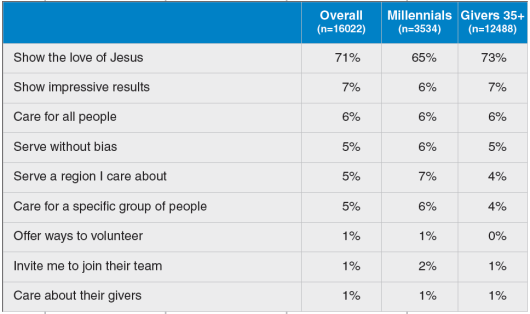
Volunteer opportunities might be why more than half of millennials said they’re more likely to support ministries that benefit their community (53% vs. 47% of older givers). They’re also interested in providing food, water, shelter, sanitation, and education. And they’re more likely to support caring for the poor and orphans, addressing injustices, or advocating for a cause.
Older givers are more interested in charities that evangelize, translate and distribute Bibles, teach Christians, aid in disaster relief, or strengthen marriages or families.
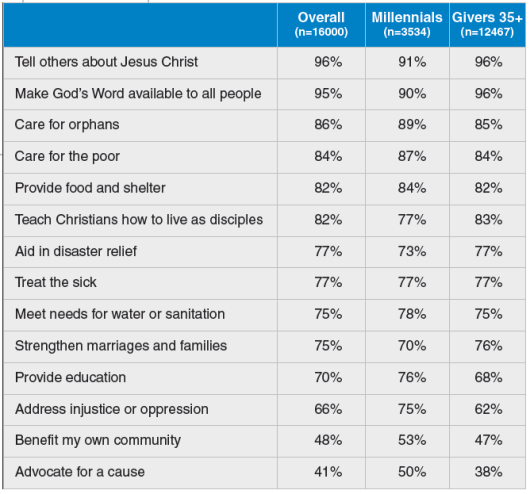
While both older and younger givers were very likely to give to their church (about 95% overall), younger givers are less likely to give to both denominational ministries (35% vs. 52%) and to secular organizations (39% vs. 49%). Of the two, they’re more likely to give to secular than to denominational efforts, unlike their older counterparts.
Nine out of 10 millennials give as they feel the Lord is leading them (92%), considering their budgeting priorities before they do (92%). They’re considerably more likely than older givers to ask others for their thoughts (57% vs. 48%) before giving.
“Ninety percent of ministry givers research a ministry on its website before giving a ‘generous’ gift, and millennials are considerably more likely to do research ‘all the time,’” stated ECFA. “They are also significantly more likely than their elders to pursue research on a third-party website.”
The sites they’re checking? Probably ECFA and the Better Business Bureau’s Give.org. A Donor Confidence Index poll showed that almost 3 in 5 of all millennial givers were familiar with the sites, while 2 in 5 knew about Charity Navigator and GuideStar.
While younger givers are more likely to support their charity on social media (26% vs. 18%), they’re doing it less than researchers thought they would.
“Contrary to popular notions, millennials are more unlikely than likely to promote ministries on social media,” the report stated. “They participate in social media because of who they are … they give because of who they are … and promoting a ministry is about what the ministry is.”
Indeed, more millennials say they give because of who they are (52% vs. 48% of older givers) or who asks (12% vs. 7%); fewer donate because the ministry asks (21% vs. 33%).
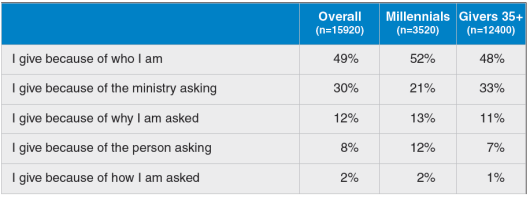
Ministries might want to consider asking millennials for a “meaningful” gift instead of a “generous” one.
“Millennials respond with a 20 percent higher optimal gift if asked for a ‘meaningful amount,’” the report stated. “In contrast, their older counterparts respond with much higher amounts when they are asked for a ‘generous’ gift than a ‘meaningful’ one.”
But millennials will likely give that donation in the same way older givers do—as an occasional or monthly gift.






